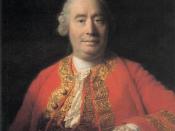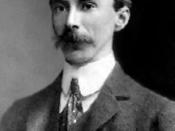The ontological argument is concerned with being it is an a priori argument for the existence of God. That is, it is not dependent on experience but is an argument where all knowledge is derived from the mind. It is also a type of argument that follows reason and not ones senses. The ontological argument is based on words and their meanings. Anselm (1033-1109), was the first philosopher to put forward the ontological argument in a logical form. He was an Italian monk who later became Archbishop of Canterbury. He was a Christian and felt there was a need to put forward an argument to prove the existence of God. His ideas and arguments are proposed in his book The Proslogian.
Anselmôs approach starts by his presentation of a definition of God, "that than which nothing greater can be conceived". This idea of God presents Him as absolutely perfect, a being that cannot be superior in greatness.
That is the greatest conceivable being and so He can be thought of. If this statement has been accepted then the next would be "it is greater to exist in reality rather than in just the mind". As it has been agreed that God is the 'greatest conceivable beingô He must exist in reality. Reality is better than thought and as God is "that than which nothing greater can be conceived"; there cannot be a being in existence that is greater than he. Therefore, God necessarily exists in reality.
By God's existence being necessary in reality Anselm is referring to a necessary truth that is something that cannot be in any other way. For example a triangle has three sides. If it didn't have three sides it would not be a triangle as the word triangle means three angles. If there are three...


